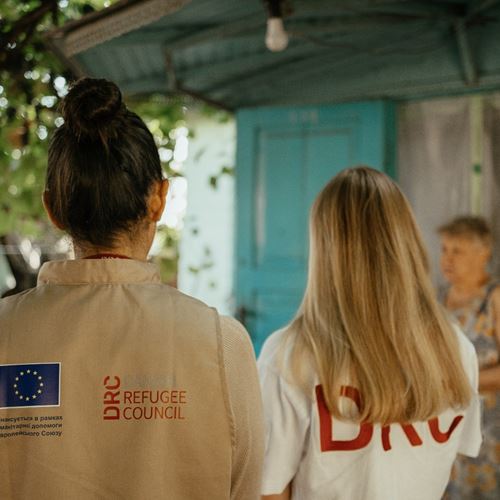
Massive humanitarian needs persist
Escalating hostilities continue to deepen humanitarian needs and heighten protection risks, particularly in front-line oblasts of Ukraine.
Protection concerns remain severe: 40% of DRC-surveyed households report feeling unsafe, while women and girls face increased risks of gender-based violence (GBV) and sexual exploitation due to reduced economic opportunities and caregiving burdens. Access to GBV response services, legal aid, and psychosocial support remains especially limited in rural and front-line areas.
The ongoing war continues to drive acute deprivation, with 42% of households experiencing extreme hardship. Many rely on cash assistance as their main source of income and are forced to adopt negative coping strategies, such as cutting back on food and healthcare. Female-headed households are disproportionately affected.
Only 28% of displaced households live in adequate housing, as widespread damage and high repair costs hinder returns.
Meanwhile, mine contamination remains a severe challenge, affecting 5.4 million people across 18 heavily contaminated raions. In oblasts such as Kharkiv and Donetsk, up to 50% of land is affected, severely impeding agriculture and local livelihoods.
The situation highlights the urgent need for protection services, legal assistance, psychosocial support, mine action, and sustained multi-sectoral aid to ensure safety, recovery, and resilience for affected communities.
New project to support the most vulnerable
In partnership with local organisations, DRC will provide multi-sectoral assistance to conflict-affected populations across seven oblasts: Dnipropetrovsk, Zaporizhzhia, Sumy, Kherson, Kharkiv, Donetsk, and Lviv.
The project aims to reach more than 27,000 people, including over 4,000 persons with disabilities.
DRC will focus on assisting the most vulnerable and marginalised groups—internally displaced persons (IDPs), host communities, residents of besieged areas, returnees, persons with disabilities, and veterans.
Key activities include:
- Protection and Legal Aid: Providing psychosocial support, GBV prevention and response, and legal assistance on documentation and housing, land, and property (HLP) rights.
- Multi-Purpose Cash Assistance (MPCA): Supporting low-income families to meet essential needs such as food, medicine, and energy.
- Shelter Assistance: Helping displaced families and returnees repair and improve their living conditions.
- Humanitarian Mine Action: Increasing awareness and promoting safety in heavily contaminated communities.
